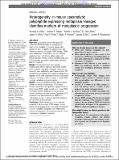| dc.contributor.author | Weis, Victoria G. | |
| dc.contributor.author | Sousa, Josane F. | |
| dc.contributor.author | LaFleur, Bonnie J. | |
| dc.contributor.author | Nam, Ki Taek | |
| dc.contributor.author | Weis, Jared A. | |
| dc.contributor.author | Finke, Paul E. | |
| dc.contributor.author | Ameen, Nadia A. | |
| dc.contributor.author | Fox, James G. | |
| dc.contributor.author | Goldenrign, James R. | |
| dc.date.accessioned | 2012-11-16T19:03:18Z | |
| dc.date.available | 2012-11-16T19:03:18Z | |
| dc.date.issued | 2012-07 | |
| dc.date.submitted | 2012-05 | |
| dc.identifier.issn | 1468-3288 | |
| dc.identifier.issn | 0017-5749 | |
| dc.identifier.uri | http://hdl.handle.net/1721.1/74663 | |
| dc.description.abstract | Objectives: Spasmolytic polypeptide-expressing metaplasia (SPEM) develops as a preneoplastic lesion in the stomachs of mice and humans after parietal cell loss. To identify the commonalities and differences between phenotypic SPEM lineages, SPEM were studied from three different mouse models of parietal cell loss: with chronic inflammation with Helicobacter felis infection; with acute inflammation with L635 treatment; and without inflammation following DMP-777 treatment.
Design: RNA transcripts from laser capture microdissected normal chief cells and SPEM lineages were compared using gene microarray. Alterations in transcripts were validated by quantitative real-time PCR. Clusterin and cystic fibrosis transmembrane conductance regulator (CFTR) were selected for immunohistochemical analysis in all mouse models as well as in human SPEM, intestinal metaplasia and gastric cancer.
Results: Transcript expression patterns demonstrated differences among the phenotypic SPEM models. Clusterin expression was significantly upregulated in all three mouse SPEM models as well as in human SPEM. The highest clusterin expression in human gastric cancers correlated with poor survival. Conversely, CFTR expression was upregulated only in SPEM with inflammation in mice. In humans, intestinal metaplasia, but not SPEM, expressed CFTR.
Conclusions: While markers such as clusterin are expressed in all phenotypic SPEM lineages, distinct patterns of upregulated genes including CFTR are present in murine metaplasia associated with inflammation, indicative of progression of metaplasia towards a more intestinalised metaplastic phenotype. | en_US |
| dc.description.sponsorship | National Institutes of Health (U.S.) (grant RO1 DK071590) | en_US |
| dc.description.sponsorship | United States. American Recovery and Reinvestment Act of 2009 (ARRA supplement (DK071590-S1)) | en_US |
| dc.description.sponsorship | National Institutes of Health (U.S.) (NIH grant RO1 AI037750) | en_US |
| dc.description.sponsorship | National Institutes of Health (U.S.) (NIH grant P30 ES02109) | en_US |
| dc.description.sponsorship | National Institutes of Health (U.S.) (NIH grant R01 DK 077065) | en_US |
| dc.description.sponsorship | National Institutes of Health (U.S.) (NIH grant P50 CA95060) | en_US |
| dc.description.sponsorship | Vanderbilt Digestive Disease Center (P30 DK058404) | en_US |
| dc.description.sponsorship | Vanderbilt-Ingram Cancer Center | en_US |
| dc.language.iso | en_US | |
| dc.publisher | BMJ Publishing Group | en_US |
| dc.relation.isversionof | http://dx.doi.org/10.1136/gutjnl-2012-302401 | en_US |
| dc.rights | Article is made available in accordance with the publisher's policy and may be subject to US copyright law. Please refer to the publisher's site for terms of use. | en_US |
| dc.source | BMJ | en_US |
| dc.title | Heterogeneity in mouse spasmolytic polypeptide-expressing metaplasia lineages identifies markers of metaplastic progression | en_US |
| dc.type | Article | en_US |
| dc.identifier.citation | Weis, V. G. et al. “Heterogeneity in Mouse Spasmolytic Polypeptide-expressing Metaplasia Lineages Identifies Markers of Metaplastic Progression.” Gut (2012): p.1-10. Web. ©2012 BMJ Publishing Group Ltd & British Society of Gastroenterology. | en_US |
| dc.contributor.department | Massachusetts Institute of Technology. Department of Biological Engineering | en_US |
| dc.contributor.department | Massachusetts Institute of Technology. Division of Comparative Medicine | en_US |
| dc.contributor.mitauthor | Fox, James G. | |
| dc.relation.journal | Gut | en_US |
| dc.eprint.version | Final published version | en_US |
| dc.type.uri | http://purl.org/eprint/type/JournalArticle | en_US |
| eprint.status | http://purl.org/eprint/status/PeerReviewed | en_US |
| dspace.orderedauthors | Weis, V. G.; Sousa, J. F.; LaFleur, B. J.; Nam, K. T.; Weis, J. A.; Finke, P. E.; Ameen, N. A.; Fox, J. G.; Goldenring, J. R. | en |
| dc.identifier.orcid | https://orcid.org/0000-0001-9307-6116 | |
| mit.license | PUBLISHER_POLICY | en_US |
| mit.metadata.status | Complete | |
